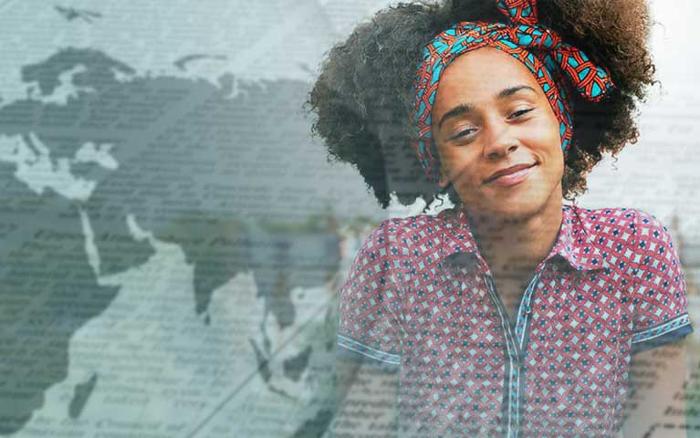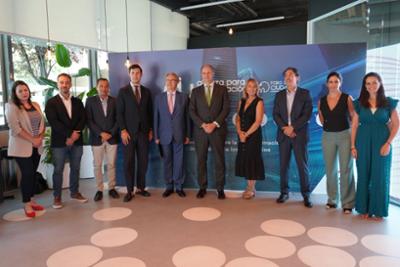

FORO DE LAS CIUDADES DE MADRID announces its new PARTNERSHIP FOR URBAN INNOVATION initiative
At the "Digitaliza Madrid" Innovation Centre of the Community of Madrid, on 18 June 2025
On 18 June, the 'Digitaliza Madrid' Centre of the Community of Madrid hosted the presentation of the PARTNERSHIP FOR URBAN INNOVATION, a new initiative of FORO DE LAS CIUDADES DE MADRID, which aims to generate permanent meeting spaces between different organisations to advance in the proactive debate on the construction of innovative and sustainable cities
FORO DE LAS CIUDADES DE MADRID, organised by IFEMA MADRID, held its last edition in June 2024, together with the 21st International Trade Fair for Urban Planning and the Environment, TECMA, and the International Trade Fair for Recovery and Recycling, SRR.
The Partnership for Innovation was created with the aim of being an open, transversal and dynamic space that provides support to local entities, companies and professionals involved in new urban designs. A total of 11 entities are part of the platform: Madrid City Council; the Community of Madrid; the Spanish Network of Smart Cities (RECI); the Higher Council of Architects' Associations of Spain (CSCAE); the Madrid Federation of Municipalities (FMM); Local Governments for Sustainability (ICLEI Europe); the Union of Ibero-American Capital Cities (UCCI); the Official College of Telecommunications Engineers (COIT); Madrid World Capital City (MWCC); Real Estate Future Institute and the European University.
David Moneo, Director of FORO DE LAS CIUDADES DE MADRID, opened the conference by highlighting that this Partnership seeks "the meeting of cities and professionals who provide us with a vision and perspective on how technological innovation is not only a critical element in the future of the world's cities, but also a lever for transformation to advance sustainable urban development".
Moneo also explained that the Partnership complements the FORO DE LAS CIUDAES DE MADRID, the seventh edition of which will take place from 9 to 11 June 2026. In his words: "If the FORO DE LAS CIUDADES is the big event that takes place every two years, the Partnership will be a permanent gateway over time, making Madrid as an important epicentre of the urban future".
After Moneo's presentation, it was the turn for institutional interventions by José de la Uz, President of the Spanish Network of Smart Cities (RECI) and Mayor of Las Rozas, and Ángel Niño, Delegate of the Innovation and Entrepreneurship Area of the Madrid City Council.
"RECI had to join this Partnership," said de la Uz, who highlighted the moment of change that cities are experiencing as a result of a "technological revolution that is going so fast that our specifications are becoming obsolete. Cities certainly have to be prepared for what is coming, which is why it is so important that they collaborate through networking," he added.
For his part, Ángel Niño emphasised the attraction of talent as an essential component for the future of cities: "It is essential that European cities have a clear roadmap to attract and retain talent and, above all, to become sustainable cities that are the best to live in and where we all think that the future we will generate is better than the present.
This was followed by the roundtable "Urban technological innovation at the service of well-being and efficiency", moderated by Adrián Nogales, Director of Institutional Relations of the Official Association of Telecommunications Engineers (COIT).
It benefited from the participation of Sergio García-Gasco, Deputy Director of the Observatory 2030 of the CSCAE; Michael Leitner-Hickisch, from the Department of Digitalisation and AI of Urban Innovation Vienna; José Manuel Zarzoso, Secretary General of the Federation of Municipalities of Madrid (FMM); Pasi Rautio. Service Manager / Team Lead, Strategic Department Data and Analytics, AI and Optimation of Helsinki; Myriam Peón, Director General of the Office of the General Urban Development Plan of Madrid (Madrid City Council); Lisa Enarsson, project manager at the Environment and Health Department of Stockholm; David García Núñez, President of Madrid World Capital City (MWCC), and Gianmarco Palmieri, delegate for Environment, President of the Environment Commission for Roma Capitale.
The presentation of the conclusions of the roundtable was given by Julia Ayuso, Director of the School of Sustainability of the European University, pointing out that "cities are a reflection of a collective decision, if we want a fair, liveable and sustainable city, spaces like this Partnership are very necessary to connect those who make design decisions, regulate, undertake and research in cities. It is important to network and share experiences, even sharing failures," said Ayuso.
The event was closed by Miguel López-Valverde, Minister of Digitalisation of the Community of Madrid, who highlighted the value of collaboration between technology and public administration, which is evident in issues such as data exchange. "Technology can help optimise service delivery in all areas. Sharing data is as essential as it is for professionals to make decisions based on this data. But these are decisions that must be based on the needs of the citizens," added the councillor, who also highlighted the importance of the human factor: "Technology is an enabler, but we must always have a human, social prism that says where we want to go. We must never lose that".
The IFEMA MADRID Urban Innovation Partnership will start its activity from July 2025, organising events, meetings and workshops between cities and professionals in new technologies and sustainable urban development.
More information about the IFEMA MADRID Cities Forum Urban Innovation Partnership
Contact persons:
Borja Frutos [email protected]
ICS Communication-Carlos Martí carlosmarti@icscomunicación.com
Caption of the family photo of the presentation of the URBAN INNOVATION PARTNERSHIP - FORO DE LAS CIUDADES DE MADRID
The family photo shows the participants in the presentation by FORO DE LAS CIUDADES DE MADRID of the Urban Innovation Partnership, held on 18 June. The group photo shows 10 of the 11 partner organisations and entities after the launch event of the new Urban Innovation Partnership.
From left to right: Julia Ayuso, Director of the School of Sustainability of the European University; Sergio García-Gasco, Deputy Director of the Observatory 2030 of the CSCAE; José Manuel Zarzoso, Secretary General of the Federation of Municipalities of Madrid (FMM); David García Núñez, President of Madrid World Capital City (MWCC); Adrián Nogales, Director of Institutional Relations of the Official College of Telecommunications Engineers (COIT); Miguel López-Valverde, Councillor for Digitalisation of the Community of Madrid; Myriam Peón, Director General of the Office of the General Urban Development Plan of Madrid (Madrid City Council); David Moneo, Director FORO DE LAS CIUDADES DE MADRID; Luciana Binaghi, Director General of the Union of Ibero-American Capital Cities (UCCI), and Candela Vázquez, Director of the Real Estate Future Institute.





